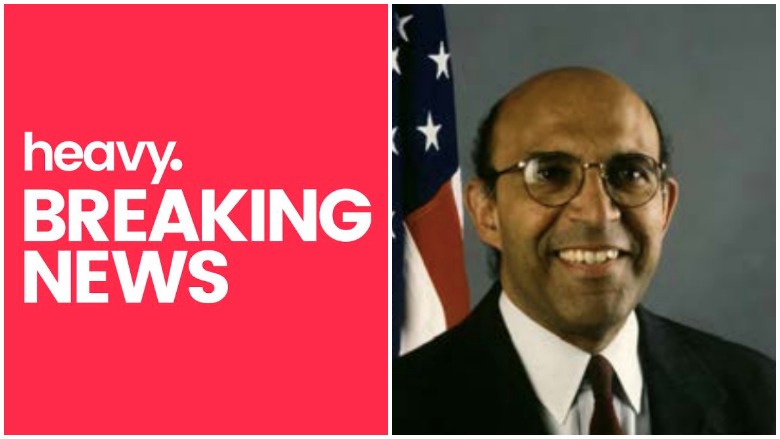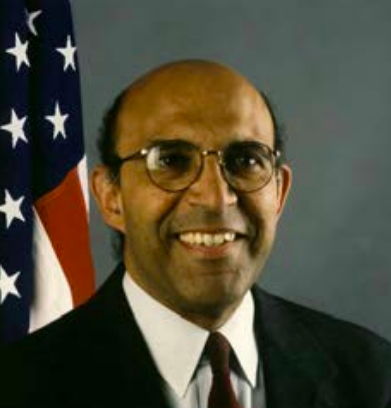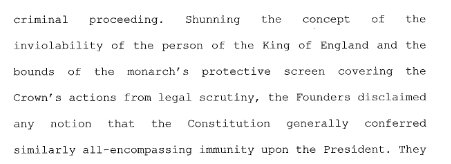
Judge Victor Marrero is a Senior United States District Judge for the District Court for the Southern District of New York. He was nominated by President Bill Clinton in 1999, and replaced the vacant seat for Sonia Sotomayor, who is now serving on the Supreme Court.
On Monday, October 7, Marrero struck down Donald Trump’s legal argument that sitting presidents cannot be investigated. His scathing, 75-page ruling is available to read in full. He wrote at one point, “This Court cannot endorse such a categorical and limitless assertion of presidential immunity from judicial process as being countenanced by the nation’s constitutional plan…the expansive notion of constitutional immunity here…would constitute an overreach of executive power.”
Marrero is married to Veronica White, who also works in the legal field. Here’s what you need to know:
1. Marrero Has Served as the Assistant to the Mayor, Worked in City Planning, & Served in Housing & Urban Development Too

Marrero’s professional resume reveals a wide range of occupations. He first worked as an assistant to the Mayor after graduating from Yale; the mayor of New York City was John Lindsay at the time. Marrero also worked as the Executive Director of the Department of City Planning, the Special counsel to the comptroller of New York City, and the Chairman of the City Planning Commission in the 70s, among other positions.
Per his Federal Judicial Court resume, here’s a full list of positions he’s held throughout his career:
- Assistant, Mayor John V. Lindsay, New York City, 1968-1970
- Assistant administrator and neighborhood director, Model Cities Administration, New York City, 1970-1973
- Executive director, Department of City Planning, New York City, 1973-1974
- Special counsel to the comptroller, New York City, 1974-1975
- First assistant counsel, Gov. Hugh Carey, New York, 1975-1976
- Chairman, City Planning Commission, New York City, 1976-1977
- Commissioner and vice chairman, New York State Housing Finance Agency, 1978-1979
- Undersecretary of housing and urban development, 1979-1981
Private practice, New York City, 1981-1993 - U.S. ambassador on the Economic and Social Council of the United Nations, 1993-1997
- U.S. ambassador and permanent representative of the United States to the Organization of American States, 1998-1999
2. Marrero Co-Founded the Puerto Rican Legal Defense & Education Fund in 1972
One of Marrero’s many endeavors prior to becoming a judge included the co-founding of the Puerto Rican Legal Defense and Education Fund in 1972. He co-founded the legal group with Cesar Perales and Jorge Batista.
3. Marrero Received His Law Degree at Yale; He Is Originally From Puerto Rico
Marrero is originally from Puerto Rico. He attended New york University as an undergraduate, and graduated in 1964. Then he went straight to law school at Yale University, graduating in 1968, per a bio of the judge from the Federal Judicial Center.
Per an interview with Sidley in 2018, Marrero said he likes to spend his down time watching movies with his wife, Veronica, in their apartment in the Upper West Side of Manhattan. He said that he and his wife both love spending time in Central Park, too, though they keep their activities less than strenuous.
He explined, “I used to play sports—baseball, swimming, sailing and tennis—when I was younger. Nowadays, it’s basically whatever forms of exercise one can get without breaking bones.”
4. Marrero Struck Down Aspects of the PATRIOT Act on Two Separate Occasions
In 2007, Marrero struck down parts of the PATRIOT Act, saying that courts need to be allowed to look over cases where the government requires internet providers to hand over information and records without notifying their customers.
Per an archived article from NBC News, Marrero said the Act “offends the fundamental constitutional principles of checks and balances and separation of powers.”
He wrote in his ruling, “It is axiomatic that in our system of government it is the province of the courts to say what the law is. When Congress attempts to curtail or supersede this role, it jeopardizes the delicate balance of powers among the three branches of government and endangers the very foundations of our constitutional system.”
In an interview with Sidley, Marrero recalled. “The portion of the Patriot Act I was involved in developed after the September 11th attacks…Companies receiving the letters were mandated to comply and provide information about their customers without discussing the secret request first with anybody, at any time, and in perpetuity.” He added, “So that naturally raised a lot of First Amendment and Fourth Amendment concerns.”
5. Marrero’s 75 Page Ruling Against Trump Called POTUS’ Argument ‘Repugnant’
In Marrero’s 75-page ruling striking down Trump’s argument claiming that sitting presidents are immune to investigations, the judge called the legal argument “repugnant,” among other things.
You can read the full ruling here.
